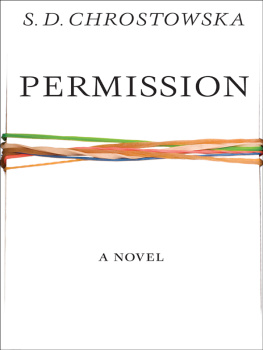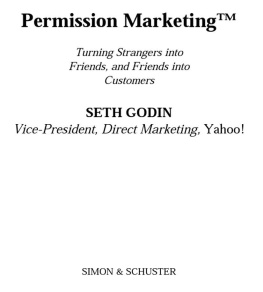Chrostowska - Permission
Here you can read online Chrostowska - Permission full text of the book (entire story) in english for free. Download pdf and epub, get meaning, cover and reviews about this ebook. year: 2013, publisher: Columbia University Press, genre: Religion. Description of the work, (preface) as well as reviews are available. Best literature library LitArk.com created for fans of good reading and offers a wide selection of genres:
Romance novel
Science fiction
Adventure
Detective
Science
History
Home and family
Prose
Art
Politics
Computer
Non-fiction
Religion
Business
Children
Humor
Choose a favorite category and find really read worthwhile books. Enjoy immersion in the world of imagination, feel the emotions of the characters or learn something new for yourself, make an fascinating discovery.
- Book:Permission
- Author:
- Publisher:Columbia University Press
- Genre:
- Year:2013
- Rating:3 / 5
- Favourites:Add to favourites
- Your mark:
- 60
- 1
- 2
- 3
- 4
- 5
Permission: summary, description and annotation
We offer to read an annotation, description, summary or preface (depends on what the author of the book "Permission" wrote himself). If you haven't found the necessary information about the book — write in the comments, we will try to find it.
Permission — read online for free the complete book (whole text) full work
Below is the text of the book, divided by pages. System saving the place of the last page read, allows you to conveniently read the book "Permission" online for free, without having to search again every time where you left off. Put a bookmark, and you can go to the page where you finished reading at any time.
Font size:
Interval:
Bookmark:

PERMISSION
PERMISSION
S. D. CHROSTOWSKA

To J. G. z. L. z. G.
N. Heres your manuscript. I have read it all the way through.
R. All the way through? I see: you expect few will do the same?
N. Vel duo, vel nemo.
R. Turpe et miserabile. But I want a straightforward judgment.
N. I dare not.
R. You have dared everything with that single word. Explain yourself.
N. My judgment depends on the answer you are going to give me. Is this correspondence real, or is it a fiction?
R. I dont see that it matters. To say whether a Book is good or bad, how does it matter how it came to be written?
N. But surely its no more than a fiction?
R. Suppose it is.
N. In that case, Ive never seen such a bad piece of work. These Letters are no Letters; this Novel is no Novel; the characters are people from the other world.
R. Your judgment is harsh; the Publics is bound to be even harsher. Without calling it unjust, I would like to tell you in turn the way I see these Letters...
In seclusion, one has other ways of seeing and feeling than in involvement with the world; the passions differently modified also have different expressions; the imagination, constantly encountering the same objects, is more vividly affected by them. That small number of images keeps returning, mixes with all these notions, and lends them the odd and repetitious turn one notices in the conversation of Solitary Folk. Does it then follow that their language is highly forceful? Not at all; it is merely extraordinary. It is only in the world that one learns to speak forcefully... Passion, overflowing, expresses itself more effusively than forcefully. It does not even think of being persuasive; it does not suspect that anyone may question it.
Let me return to our letters. If you read them as the work of an Author who wishes to please, or who has pretensions of writing, they are detestable. But take them for what they are, and judge them according to their kind.
Jean-Jacques Rousseau,
Second Preface to Julie, Or the New Heloise
Let this be a short introduction. He received the first message, an email, one evening in mid-July. A week of silence followed and he received another, then another one week later, and so forth, quite regularly until the end of April of the next year. And as the messages became more involved, that measured intermission must have seemed too short to him. Though this may be construed as a selfish reaction, I suspect he saw the pace imposed by the sender as mechanical, even sadistic. The writer of these messages may have appeared over-reliant on regularity, not merely very disciplined but totally obsessed with discipline; then again, perhaps there was no inner compulsion; or perhaps the author wanted to appear exemplary, consistent and determined in his eyes, to give their work and effort more credibility, reality... In any case, even the said recipients acceptance of these text-offerings, engaged without a word of reply, must have placed increasing demands on his time, which he might have liked to give freely, were that possible. What with his work schedule, travel, and other pressing business, he often could not reflect on them and, as another week elapsed, was mentally unprepared to receive more. Reading and rereading these notes required more of him than he could give, and more time than was at his disposal. One imagines also that initially he was too put off by their intellectual arrogance and posturing to have genuine interest in them. But as the communication became more erratic, his curiosity may have grown and eventually reached a point where it could scarcely be contained. On the one hand, the thorough reading for which he could not make time but now and then was compelled to, on the other hand, his increasingly cursory attention (immersed as he was in his own work)such vacillation between the peculiar strangeness and pleasure of this reading and its absolute irrelevance to his life and work might have repeatedly led to frustration, so much so, he might have considered writing the author to ask them to let up, to allow him to catch up. But before he could bring himself to do it, he realized no doubt the relative minority of these events, or feared the encouragement a reply might give, or saw the tactlessness of such a request, contravening the correspondences onesidedness, and understood that among the consequences of interrupting the flow and tempo of the writing was no less than its cessation. In the end, he honored the authors wish and never wrote back.
May 2008
(07.21.07)
Permit me to write to you today, beyond today. Not a letter, journal entry, or essay, much less a monologue or poem, but a note, and no more than this notewhich, even if now it stands alone and autonomous, must now contain itself and attend to its own completion, aspires also, from the very first, to be more than itself, already knows itself as a fragment of some past or future whole: possibly of a book, making this an experiment in the writing of a book (that it is the opening of one is not out of the question), a book-ward writing perpetuated through one readers reading of it, the writing and reading pursuant to desire and terminating at desires end. Unquestionably and above all, however, this note is a gift, an experiment in giving.
That is to say, I want nothing in return, nothing tangibleonly permission to continue this spectral writing, so disembodied and out of place, so easily disavowed. It is enough for me if your eyes follow this specter until it vanishes. I do not ask that you acknowledge me. You offered your work to the world with the hope it would set aside time for it, the time needed, and if indeed time was set aside for it in every time zone, if I set aside for it my own time, it was not on condition of reciprocity. If I now offer my work (a work in progress) to you (you of all people), it is with the same hope: that you too will set aside your time, the time needed for it.
You were not a random choice. My own identity, on the other hand, is random and immaterial. I imagine many strangers send you missives of gratitude as well as criticism, words beautiful and honest, bristling or brimming with emotion. Mine is one among those you randomly chose to open. My identity would mean nothing to you because we have never met. Revealing it alone would give nothing away and neither compromise nor raise me in your esteem. It would be of no consequence to your life since I as such cannot materialize in it. I prefer my fingerprints eroded by the anonymity of zeros, ones. Imagine this preference is for the sake of keeping honest an experiment that could break off at any pointwithout warning or explanation, without resumption.
Clandestine transgressions like this writing are easily forgotten, most of all by the perpetrators themselves. Because they are led to transgress against conventions by their desire, such people are unwilling to own up to its pursuit. They act irresponsibly to evade punishment by the arbiters elegantiae. There is no place for their adventure within the unbroken continuity of the everyday. Their activity must be kept secret if their desire is to continue burning with the same intensity. At once, certain inalienable elements of their pursuit end up sacrificed to this secrecy. The subtleties of reflection and emotion that made them take the boldest because decisive stepthey are soon forgotten and cannot be retraced. I, for one, could no longer dramatize the conception of this writing. If confronted by common sense, I might admit its absolute absurdity. My avowal of this absurd act of writing would coincide with my disavowal of it. A well-kept secret can prove a trap for the weak of will.
Next pageFont size:
Interval:
Bookmark:
Similar books «Permission»
Look at similar books to Permission. We have selected literature similar in name and meaning in the hope of providing readers with more options to find new, interesting, not yet read works.
Discussion, reviews of the book Permission and just readers' own opinions. Leave your comments, write what you think about the work, its meaning or the main characters. Specify what exactly you liked and what you didn't like, and why you think so.












